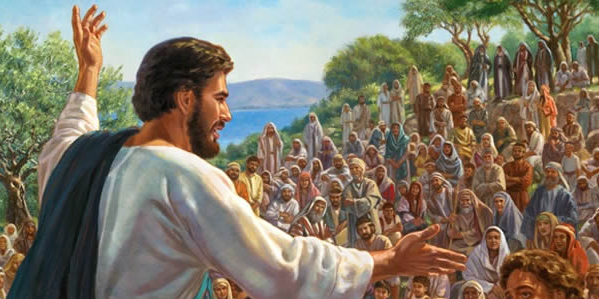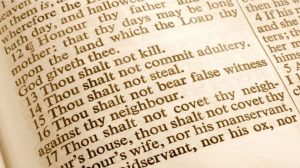
Matthew 11:5 AV
The blind receive their sight,
and the lame walk,
the lepers are cleansed,
and the deaf hear,
the dead are raised up,
and the poor have the gospel preached to them.
Study
Other translations
New International Version
The blind receive sight, the lame walk, those who have leprosy are cleansed, the deaf hear, the dead are raised, and the good news is proclaimed to the poor.
New Living Translation
the blind see, the lame walk, those with leprosy are cured, the deaf hear, the dead are raised to life, and the Good News is being preached to the poor.”
English Standard Version
the blind receive their sight and the lame walk, lepers are cleansed and the deaf hear, and the dead are raised up, and the poor have good news preached to them.
Berean Study Bible
The blind receive sight, the lame walk, the lepers are cleansed, the deaf hear, the dead are raised, and the good news is preached to the poor.
Berean Literal Bible
[The] blind receive sight, and [the] lame walk, [the] lepers are cleansed, and [the] deaf hear, and [the] dead are raised, and [the] poor are gospelized.
King James Bible
The blind receive their sight, and the lame walk, the lepers are cleansed, and the deaf hear, the dead are raised up, and the poor have the gospel preached to them.
New King James Version
[The] blind see and [the] lame walk; [the] lepers are cleansed and the deaf hear; [the] dead are raised up and [the] poor have the gospel preached to them.
New American Standard Bible
[those who are] BLIND RECEIVE SIGHT and [those who] limp walk, [those] with leprosy are cleansed and [those who are] deaf hear, the dead are raised, and [the] POOR HAVE THE GOSPEL PREACHED TO THEM.
NASB 1995
the BLIND RECEIVE SIGHT and the lame walk, the lepers are cleansed and the deaf hear, the dead are raised up, and the POOR HAVE THE GOSPEL PREACHED TO THEM.
NASB 1977
[the] BLIND RECEIVE SIGHT and [the] lame walk, [the] lepers are cleansed and [the] deaf hear, and [the] dead are raised up, and [the] POOR HAVE THE GOSPEL PREACHED TO THEM.
Amplified Bible
the BLIND RECEIVE [their] SIGHT and the lame walk, the lepers are cleansed [by healing] and the deaf hear, the dead are raised, and the POOR HAVE THE GOSPEL PREACHED TO THEM.
□ ■ □
The blind receive their sight
At least one instance of each class of miracle has already been recorded by Matthew,
▪︎ the blind (Matthew 9:27),
▪︎ the lame (Matthew 9:6),
▪︎ the leper (Matthew 8:2),
▪︎ the dead (Matthew 9:25).
The raising of the widow’s son at Nain, which in Luke follows closely upon the healing of the centurion’s servant, must also have preceded what is here narrated.
When you are in doubt you may not need the knowledge of fresh facts, but a different way of looking at those you already know.
Where these works were done, there were tokens that the coming One had indeed come. But above all signs and wonders, there was another spiritual note of the Kingdom, which our Lord reserves as the last and greatest: Poor men have the good news proclaimed to them.
Our Lord here, has reference to several prophecies concerning the Messiah, in Isaiah 35:6 and which having their accomplishment in him.
John and his disciples might easily and strongly conclude, that He was He that was to come, and that they should not look for another.
The several things here mentioned, were not all done at this time, but were what these disciples had sufficient and authentic evidence of; sight was restored to the blind before them then; and no doubt they were informed of the two blind men, that had their eyes opened (Matthew 9:30).
The lame walk
Tyndale: The halt go.
The lame walk, as did the man sick of the palsy, who was brought to him on a bed, carried by four men, but went away himself, with his bed upon his shoulders, (Matthew 9:2)
The lepers are cleansed
The lepers are cleansed, as was the poor man, that was full of leprosy, and who was cured by the Christ, by touching him (Matthew 8:3).
The deaf hear
The deaf hear, as did the man, into whose ears Christ put his fingers and said, Ephphatha, be opened (Mark 7:33).
The dead are raised
The dead are raised, as were Jairus’s daughter (Matthew 9:18) and in Nain the widow’s son (Luke 7:15).
The poor have the good news proclaimed to them.
The poor are invited to the Kingdom, and told of peace and pardon.
It is as though our Lord knew that the Baptist, whose heart was with the poor, would feel that One who thus united power and tenderness could be none other than the expected King.
It was predicted of the Messiah that he would preach good tidings to the meek (Isaiah 61:1); or, as it is rendered in the New Testament, “He hath anointed me to preach the gospel to the poor,” (Luke 4:18).
By this, you too may infer that He was truly the Messiah.
It adds to the force of this testimony that the “poor” have always been overlooked by Pharisees and philosophers.
No sect of philosophers had condescended to notice them before the Christ, and no system of religion had attempted to instruct them before the Christian religion.
In all other schemes the poor have been passed by as unworthy of notice.
The poor have the Gospel preached them; by “the poor” are meant,
- Either the preachers of the Gospel; for so the words may be rendered, “the poor preach the Gospel”: and such were the apostles of Christ; they were poor with respect to the things of this world; they were chiefly fishermen; and, with respect to human literature, they were unlearned men, had no stock or furniture of acquired learning, and were mean, abject, and contemptible, in the sight and opinion of men; and yet Christ called, qualified, and sent them forth to preach the Gospel.
- Or else, the hearers of it are designed; who were also the poor of this world, made a very low figure in life, and had but a small share of knowledge and understanding, and so were despised, and reckoned as cursed by the Scribes and Pharisees:
- Or they were such, who were poor in spirit, or spiritually poor; who saw their spiritual poverty, bewailed and acknowledged it, and sought after the true riches of grace, and glory in Christ.
Now these, as they had the Gospel preached to them more fully and clearly, with more power and authority, and so as it never was before or since, so they “received” it.
▪︎ As Tremellius from the Syriac reads the text, readily and willingly, joyfully and gladly, with faith and love; and were,
▪︎ as it may be also rendered, “evangelized” by it, or thrown into a gospel mould and frame: which may be said to be done, when a man has a spirit of liberty, in opposition to a spirit of bondage;
- when he lives by faith on Christ alone;
- when his comforts do not spring from his works, but from the Christ;
- when the love and grace of God influence his repentance and obedience;
- when a man has a spirit of meekness and of love to the saints, is of a forbearing and forgiving spirit:
- when he is desirous of performing all duties both to God and man, and yet depends upon none of them, but upon the Christ alone, for salvation.
πτωχοὶ εὐαγγελ (the poor have the gospel preached to them) is a well-known passive construction, as in Hebrews 4:2, 6; Galatians 2:7; Romans 3:2; Hebrews 11:2.
In earthly kingdoms envoys are sent to the rich and great.
Compare the thought implied in the disciple’s words, “Who then can be saved?” If it is difficult for the rich to enter the kingdom, how much more for the poor?
The poor
πτωχοί (the poor) points to the poor, the miserable, the friendless, the oppressed and helpless (comp. Matthew 5:3),
elsewhere compared to sheep without a shepherd (Matthew 9:36),
and likened a little further on to a bruised reed and smoking flax (Matthew 12:20).
Such people crowded about our Lord, who proclaimed to them the Messianic deliverance. And this deliverance they actually obtained when, as πτωχοὶ τῷ πνεύματι, Matthew 5:3, they surrendered themselves to His word under a deep heartfelt consciousness of their need of help.
Have the gospel preached to them
Εὐαγγελίζονται, are evangelized
The word is passive (cf. Luke 16:16).
For the works of our Lord Himself, which the disciples of John then saw and heard, are meant (cf. Luke 4:18), concerning the prediction of this work.
Nor did all poor men as yet preach the Gospel, but only the apostles (See Matthew 10:7).
Greek
Blind ☆ τυφλοὶ (typhloi) ☆ Adjective – Nominative Masculine Plural ☆ Blind, physically or mentally. From, tuphoo; opaque, i.e. blind.
Receive sight ☆ ἀναβλέπουσιν (anablepousin) ☆ Verb – Present Indicative Active – 3rd Person Plural ☆ To look up, recover my sight. From ana and blepo; to look up; by implication, to recover sight.
Lame ☆ χωλοὶ (chōloi) ☆ Adjective – Nominative Masculine Plural ☆ Lame, deprived of a foot, limping. Apparently a primary word; ‘halt’, i.e. Limping.
Walk ☆ περιπατοῦσιν (peripatousin) ☆ Verb – Present Indicative Active – 3rd Person Plural ☆ From peri and pateo; to tread all around, i.e. Walk at large; figuratively, to live, deport oneself, follow.
Lepers ☆ λεπροὶ (leproi) ☆ Adjective – Nominative Masculine Plural ☆ A leprous person, a leper. From the same as lepra; scaly, i.e. Leprous.
Cleansed ☆ καθαρίζονται (katharizontai) ☆ Verb – Present Indicative Middle or Passive – 3rd Person Plural ☆ To cleanse, make clean, literally, ceremonially, or spiritually, according to context. From katharos; to cleanse.
Deaf ☆ κωφοὶ (kōphoi) ☆ Adjective – Nominative Masculine Plural ☆ (literally: blunted) dumb, dull, deaf. From kopto; blunted, i.e. of hearing or speech.
Hear ☆ ἀκούουσιν (akouousin) ☆ Verb – Present Indicative Active – 3rd Person Plural ☆ To hear, listen, comprehend by hearing; pass: is heard, reported. A primary verb; to hear.
Dead ☆ νεκροὶ (nekroi) ☆ Adjective – Nominative Masculine Plural ☆ (a) adj: dead, lifeless, subject to death, mortal, (b) noun: a dead body, a corpse. From an apparently primary nekus; dead.
Raised ☆ ἐγείρονται (egeirontai) ☆ Verb – Present Indicative Middle or Passive – 3rd Person Plural ☆ (a) I wake, arouse, (b) I raise up. Probably akin to the base of agora; to waken, i.e. Rouse.
And ☆ καὶ (kai) ☆ Conjunction ☆ And, even, also, namely.
Good news is preached ☆ εὐαγγελίζονται (euangelizontai) ☆ Verb – Present Indicative Middle or Passive – 3rd Person Plural ☆ From eu and aggelos; to announce good news especially the gospel.
Poor ☆ πτωχοὶ (ptōchoi) ☆ Adjective – Nominative Masculine Plural ☆ Poor, destitute, spiritually poor, either in a good sense (humble devout persons) or bad.
□ ■ □
Read more of these messages at: https://devotionals.harryschoemaker.nl
Download your Bible pictures from: http://bijbelplaatjes.nl
Follow me on Twitter: @schoemakerharry
Email: devotionals@harryschoemaker.nl





